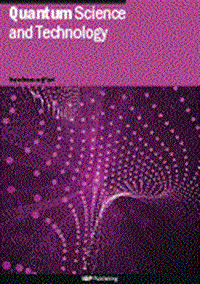随机基准测试中的操作马尔可夫化
IF 5.6
2区 物理与天体物理
Q1 PHYSICS, MULTIDISCIPLINARY
引用次数: 0
摘要
要获得最佳和可靠的量子设备,一项关键任务就是量化它们的整体性能。量子门的平均保真度是一个特殊的性能指标,可以通过随机基准(RB)进行有效估算。然而,门保真度的概念本身依赖于一个重要的假设,即噪声以可预测的、时间局部的或所谓马尔可夫的方式表现,随着量子器件规模和深度的扩大,噪声的破坏自然会成为误差的主要来源。我们通过分析表明,动态解耦 (DD) 和保利漩涡等误差抑制技术可以在操作上使 RB 马尔可夫化:(i) 快速 DD 将非马尔可夫 RB 降为指数衰减加较长时间校正,而另一方面,(ii) 保利漩涡一般不会影响平均值,但 (iii) 它总是抑制这种 RB 输出的方差。我们用一个量子位噪声模型从数值上证明了这些影响。我们的研究结果表明,简单高效的误差抑制方法可以同时驯服非马尔可夫噪声,实现标准可靠的栅极质量估计,而这正是实现全功能量子器件的重要任务。本文章由计算机程序翻译,如有差异,请以英文原文为准。
Operational Markovianization in randomized benchmarking
A crucial task to obtain optimal and reliable quantum devices is to quantify their overall performance. The average fidelity of quantum gates is a particular figure of merit that can be estimated efficiently by randomized benchmarking (RB). However, the concept of gate-fidelity itself relies on the crucial assumption that noise behaves in a predictable, time-local, or so-called Markovian manner, whose breakdown can naturally become the leading source of errors as quantum devices scale in size and depth. We analytically show that error suppression techniques such as dynamical decoupling (DD) and Pauli-twirling can operationally Markovianize RB: (i) fast DD reduces non-Markovian RB to an exponential decay plus longer-time corrections, while on the other hand, (ii) Pauli-twirling generally does not affect the average, but (iii) it always suppresses the variance of such RB outputs. We demonstrate these effects numerically with a qubit noise model. Our results show that simple and efficient error suppression methods can simultaneously tame non-Markovian noise and allow for standard and reliable gate quality estimation, a fundamentally important task in the path toward fully functional quantum devices.
求助全文
通过发布文献求助,成功后即可免费获取论文全文。
去求助
来源期刊

Quantum Science and Technology
Materials Science-Materials Science (miscellaneous)
CiteScore
11.20
自引率
3.00%
发文量
133
期刊介绍:
Driven by advances in technology and experimental capability, the last decade has seen the emergence of quantum technology: a new praxis for controlling the quantum world. It is now possible to engineer complex, multi-component systems that merge the once distinct fields of quantum optics and condensed matter physics.
Quantum Science and Technology is a new multidisciplinary, electronic-only journal, devoted to publishing research of the highest quality and impact covering theoretical and experimental advances in the fundamental science and application of all quantum-enabled technologies.
 求助内容:
求助内容: 应助结果提醒方式:
应助结果提醒方式:


